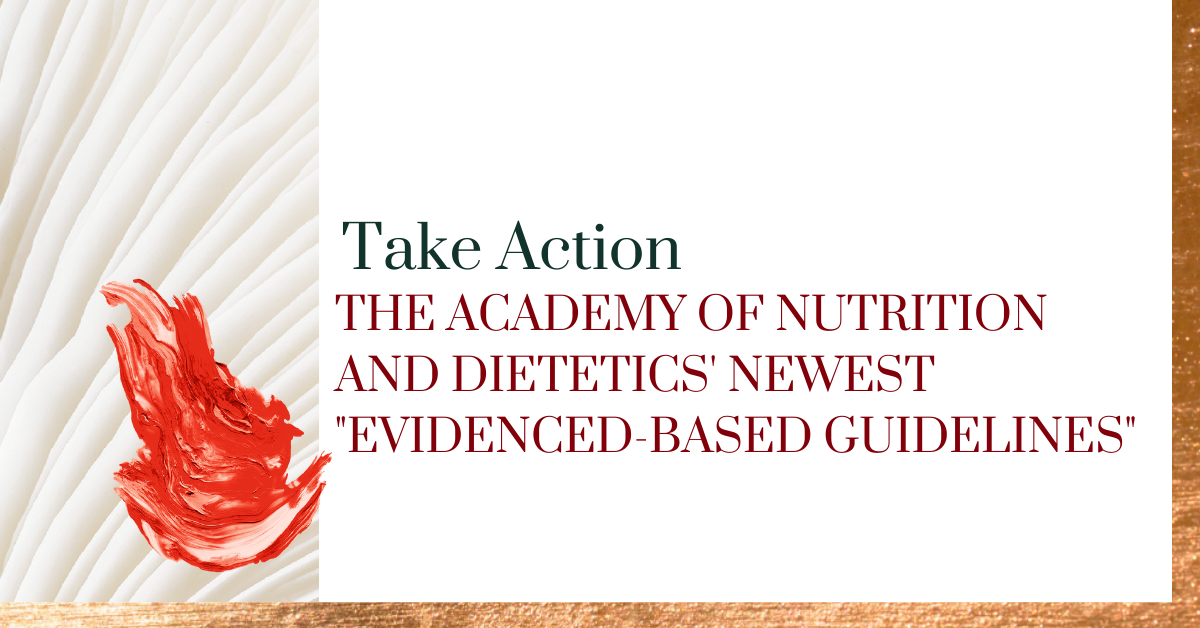Are you someone who believes in a non-stigmatizing, weight-inclusive approach to health? If so, please continue reading – a very powerful organization is trying to put forth guidelines that will have severe health consequences for higher-weight people.
Whether you’re a dietitian, healthcare provider, or community member with lived experience — any human who believes in and/or who has personally seen the benefits of a HAES-aligned approach to health and wellbeing — I’m asking you to take 2 minutes to share your thoughts with the Academy of Nutrition and Dietetics.
More details and a link to provide feedback is below (if you’re unsure what to say, keep reading).
If you haven’t already heard, the Academy of Nutrition and Dietetics has opened up public comments for their newest “Evidence-Based Nutrition Practice Guidelines” regarding Medical Nutrition Therapy Interventions for Adult O******** and O****** Treatment.
Unfortunately, these guidelines are incredibly problematic and have the potential to do large amounts of harm if they are adopted.
Some of the many (many) issues with these guidelines:
- The guidelines are full of – and perpetuate – anti-fat bias and weight stigma (which is an independent risk factor for poor health)
- They use poor quality evidence to back their recommendations (mainly citing 1C and 2C research – i.e. “they can’t even back up their own BS”)
- They use that faulty “science” to say that dietitians should not use a HAES approach to health and nutrition
- They omitted the vast amounts of research that speak to the limitations of the BMI
- There is no inclusion or acknowledgment of the Social Determinants of Health (which account for at least 2/3 of health outcomes) on the health of higher weight individuals
- They completely mischaracterize the HAES paradigm
- They recommend disordered eating behaviors including severe calorie restriction, which we know does not work in the long term for the vast majority of people AND contributes to weight cycling (which, as weight stigma, is an independent risk factor for CVD, diabetes, chronic inflammation, and much more)
Oh yeah, and there are clear conflicts of interest:
- The “systematic research” for the guidelines were funded by the Weight Management Dietetic Practice Group
- One of the six workgroup members has had her research funded by Weight Watchers.
You can read the proposed guidelines here – please consider commenting on this short survey by March 25th (4 multiple choice questions and an option fill-in the blank comment section).
** Patrille Hernandez of EmbodyLib has generously prepared and shared some suggested comments which you may use with permission**
Many folks have written more in-depth about the issues with the guidelines:
- Is the Academy of Nutrition and Dietetics Choosing Weight Stigma Over Science? by Ragen Chastain
- An Open Letter to the Academy by the Association for Size Diversity and Health (ASDAH)
- A great response to the guidelines by Weight Inclusive Nutrition and Dietetics (WIND)
- This post by Karlee Golightly, RD
- Several posts by @yourdietitianbff – including here and here
This is a very clear power grab by the Academywhich is feeling threatened by the rise in providers who are providing weight-inclusive care. (Follow the money: think of all the Academy stands to lose if they stop recommending weight-loss interventions…). The Academy is stuck in the past – unwilling and outright refusing to acknowledge or even consider the evolving research that is clearly showing the myriad of positive benefits of weight-inclusive care and the harmful outcomes of weight-loss interventions.
Look, I too felt defensive and felt like my livelihood was being threatened when I first learned of weight-inclusive care. But also: it was SO clear to me that this was a human-centered approach to health and provided the most respectful, least-stigmatizing access to health and nutrition care. (And as I’ve done a lot more unpacking, I have learned how our dominant culture – which dietetics, like everything, is steeped in – and my internalization of it contributed to my reaction)
Not to mention, when you dig into the research (which I have done) it is abundantly clear that weight-loss interventions not only do not work but that people in higher weights do not need to lose weight to be “healthy” and that there is no causal relationship between weight and health.
For example, a large research review (citing 225 papers) found that the mortality risk associated with ob*sity is largely attenuated or eliminated by moderate-to-high levels of cardiorespiratory fitness or physical activity.
If you want to look into more of the research, here are some places to start:
- An Evidence-Based Rationale for Adopting Weight-Inclusive Health Policy
- The weight-inclusive versus weight-normative approach to health: evaluating the evidence for prioritizing well-being over weight loss
- A weight-neutral vs. weight-loss approach for health promotion in women with high BMI: A randomized controlled trial
- Ob**ity Treatment: Weight loss versus increasing fitness and physical activity for reducing health risks
- Association of all-cause mortality with overweight and obesity using standard body mass index categories: a systematic review and meta-analysis
- Misclassification of cardiometabolic health when using body mass index categories in NHANES 2005-2012
If you are willing and able, please consider amplifying this message on your own channels (i.e. social media, listserves, etc).








